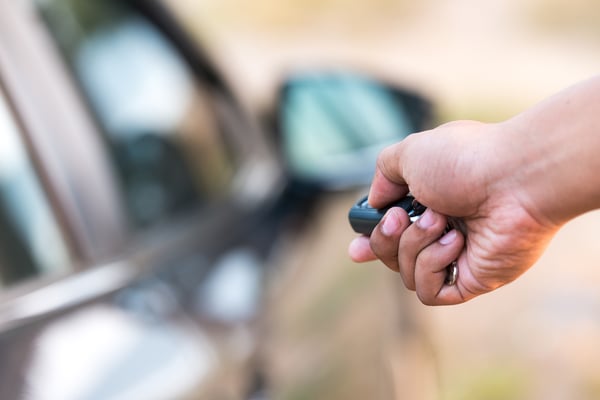Written by Neil Thomas
How to protect your vehicle against keyless car theft
Thieves are increasingly using sophisticated technology to bypass the security systems on modern vehicles. Keyless car theft is a significant threat to car owners, as well as a challenge for the automotive industry.
Highlighting the extent of keyless theft, a gang in the South East was recently jailed for stealing £2.8m of high-end keyless vehicles throughout a 10 month period. Able to access cars quickly by creating a digital copy of the key, they could drive off streets, driveways and dealership forecourts within seconds.
Fortunately, there are some important steps you can take to protect your vehicle from keyless car theft, and recover it should the worst happen. Read on to find out what these methods are.
What is keyless car theft?
Keyless car theft, also known as ‘relay theft’ or ‘signal boosting’, involves thieves using key fobs and other devices to gain access to a vehicle - they don’t need physical access to the original set of car keys. Keyless fobs have a built-in transceiver, which can both send and receive coded radio signals to the car to lock and unlock doors when the key isn't in range.
Luxury car brands such as Porsche, Tesla and Land Rover are increasingly affected by this type of theft, accounting for 48% of theft vehicle claims, according to LV. Meanwhile Thatcham Research awarded ‘Poor’ ratings to the Mazda CX-30, MG HS Excite T-GDI and Subaru Forester e-Boxer XE Premium after its security engineers were able to access and start the vehicle using relay theft equipment.
New figures show the stolen vehicle recovery rate has dropped from 80% to 28%. Find out why here.
How do thieves conduct keyless car theft?
One of the most common types of keyless car thefts can be completed in less than five minutes, using two devices. This is done using a device held up to 100m away from the key that amplifies its signal, so that it can then be sent to another transmitter close to the car, tricking the vehicle into thinking the original key is close by.
This transmitter acts as an additional key, allowing the thieves to open the car and quickly drive away (provided that the vehicle has a keyless start function). Cars stolen in this way are often sent to ‘chop shops’ and stripped for parts, sent overseas, or resold with counterfeit documentation.
Can keyless car theft be prevented?
Keyless car theft is particularly intrusive, but luckily there are some preventative measures you can take, and there are also ways to recover stolen vehicles if the unthinkable does happen.
Here are a few steps you can take to protect your vehicle and deter thieves:
1. Turn off the key fob's wireless signal when you aren't using it
This includes when you're at home, as relay theft often occurs when thieves are able to key into a fob's signal from outside. Your car’s manual should indicate whether this is possible for the make and model that you own.
2. Install a steering wheel lock
This is an effective deterrent as it makes it much more difficult for would-be thieves to steal your vehicle if they see that precautions have been taken.
3. Reprogram keyless car fobs
So that a thief won't be able to use them if they manage to get hold of them.
4. Park in well-lit areas
In particular, lit areas with CCTV coverage will deter thieves and make keyless car theft less likely.
5. Store your keys in a faraday box or keyless pouch when not in use
This will stop any malicious radio frequency signals from being received by your key fob and can help to protect against relay theft.
Using a tracking device to recover your stolen vehicle
If the worst-case scenario happens and your vehicle does fall victim to keyless car theft, having a tracking device installed in your car is one of the best ways to ensure swift recovery. However, standard tracking devices are often easy to detect by criminals. This is because they are typically installed in the same places in every vehicle, so criminals know exactly where to look.
Choosing a more sophisticated covert tracking provider means that your device will be hidden in a place that is extremely difficult for thieves to locate. Devices should always be fitted by a specialist, with the location kept secret.
It is also important to look for devices with reputable accreditations, as they will have undergone rigorous testing processes. Thatcham Research has been a leader in vehicle security for more than 30 years, and another accreditation to look out for is Secured By Design, the official police security initiative that helps to improve vehicle security.




